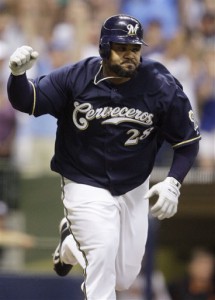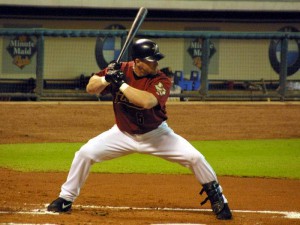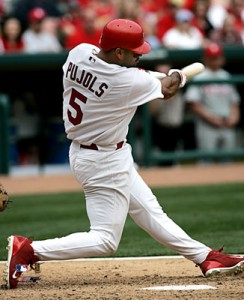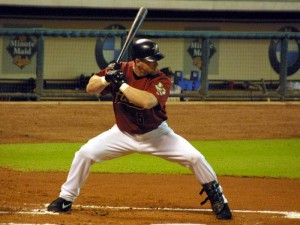Here’s Tom Boswell‘s weekly Monday chat on 11/28/11. Of the baseball questions he took, here’s how I’d have answered them. With the Wizard’s 0-8 start there’s a lot of kvetching about NBA.
As always, questions are edited for clarity and I write my own answer prior to reading his.
Q: What is your “take” on Ross Detwiler and could he become a better pitcher than Gio Gonzalez?
A: My “take” on Ross Detwiler is that he’s too frail to stay healthy long enough to be counted on for heavy-duty innings, and that he throws too much across his body to get his breaking stuff to work properly. Now, throwing across your body isn’t a bad thing (see Johnson, Randy) but Detwiler’s never been consistent long enough to be anything more than an emergency/late season starter for this team. Can he be better than Gio Gonzalez? Not really; Gonzalez is only a year older but has 60 more MLB starts, an all-star appearance and the talent to win 20 games in the AL. If Detwiler was really that promising … we wouldn’t have acquired Gonzalez in the first place. Boswell says the team likes Detwiler, but Johnson likes a lefty heavy rotation in this division. But the team already has 5 starters signed to major league contracts, so I can’t see how Detwiler wins anything more than a bullpen spot.
Q: Is Prince Fielder really coming here? Why is there so little market for him?
A: I’ll answer the 2nd part first; there’s so little market for Prince Fielder for several reasons.
- If you look at the top payroll clubs, basically every team either has a long-term 1B commitment (names like Mark Teixeira, Ryan Howard, Adrian Gonzalez, Albert Pujols, Paul Konerko, Justin Morneau, and Miguel Cabrera) or is dealing with topped-out payroll or financial issues (Mets, Giants, Dodgers) that are preventing them from purchasing a big-money star. So lots of your usual suspects are out. He’s left trying to convince mostly 2nd-tier payroll clubs to spend like first tier clubs.
- His agent Scott Boras is generally the “lets wait and try to build a crescendo of rumors” type of agent. It has clearly worked in the past … but it doesn’t seem to be working now. I think Boras’ strategy has run its course to a certain extent and teams are wary of the “mystery team” in on these major players.
- Fielder isn’t exactly an adonis of a physical specimen. He’s got a bad body, hasn’t really shown that he can control his weight, and has a pretty good barometer of his future physical condition in the form of his MLB playing father Cecil Fielder. Prince may be young and may clearly be a top5 hitter in the league, but teams are not going to want to put up 8 year commitments for a player who may be washed up by the time he’s 34. To make matters worse, Prince is a below-average first baseman AND only a handful of teams have available money and available DH spots.
Frankly, I think Prince needs to sign a shorter term deal with high AAV, get a team like the Nats to commit and then re-hit the FA market at age 30-31 when he’ll still have value.
Now, is he coming to the Nats? If I was Mike Rizzo i’d sign him in a heartbeat for 3yrs/$75M. I’d balk at an 8-year deal. But, the rumors persist and have been swirling for more than 2 weeks. So where there’s heat, there’s likely fire. Boswell says that the key date is Jan 18th, the day that the Rangers either sign or cut bait on Yu Darvish. If the Rangers suddenly have $120M that they didn’t think they’d have yesterday, they will sign Fielder.
Q: Baseball is set to announce their HOf inductees for 2012 today. Anyone you feel strongly about that should get in? What are your thoughts on Dale Murphy and Don Mattingly?
A: (note that I’m writing this BEFORE the 3pm announcement, so by the time you read this we’ll know who got in and who didn’t)
Who I believe WILL get elected: Barry Larkin
Who I believe SHOULD be in the Hall: Jeff Bagwell, Jack Morris, Barry Larkin, Tim Raines, Mark McGwire, Edgar Martinez.
What do I think about Murphy and Mattingly? Both suffer from more or less the same issue: they were both great players for very short amounts of time. Murphy was a better player all in all than we remembered and for four seasons (82-86) was probably THE best player in the game. Mattingly retired at 33 and was solid but had the same 4-year excellence followed by less flashy seasons. They’re good players who weren’t transcendent enough to get their own plaques in Cooperstown. Boswell mostly agrees with the above.
Q: What do you think of this scenario: Fielder signs elsewhere, LaRoche starts out hot, we flip him to Tampa for Upton as Harper takes over in RF and Morse moves to 1B.
A: Sounds great. Except that this scenario really only serves the perfect world desires of the Nationals. In reality LaRoche is a slow starter and we may really hear the boo-birds early. Morse was great in 2011 but most predict a sliding back. Harper probably needs some MLB adjustment time. We’ll see what happens. Boswell likes this scenario. Sure, who wouldn’t? But it does sound a bit too convenient.
Q: Is there ANY chance Boras goes for something like 3yrs/$75mil for Prince?
A: Yeah, I think there is a chance, as described above. He’ll push for longer though until the last possible minute, so this won’t play out for a while and we’ll continue to hear rumors for weeks. Boswell says it’ll “never happen.” And lays out a doomsday payroll scenario for the team. Which I don’t entirely buy; we’ve been at $60-65M in payroll for 6 years … despite being in a very wealthy market. At some point, this team will be good, will draw fans to the park and will increase revenues. And the payroll should rise to reflect that.
Q: Where are the Nats finding the (approximately) 60 runs they’ll need to add (assuming pitching stays constant) in order to go from 80 to 90 wins?
A: A good question. Some from Zimmerman, some from LaRoche, some from natural improvements from Desmond, Espinosa, and Ramos, and some from a rebound year from Werth. That’s a LOT of assumpions. Fielder would *really* help in the run creation department (he created 35 more runs than Morse last year … that’d be 5-6 wins all by himself). Boswell echos much of the above.
Q: Where do you (as an assumed HoFame voter) draw the line between admitted and suspected when it comes to steroids and the HOF?
A: If it were me, I’d go based on existing evidence. That’s all you can do. And the Mitchell Report is not really “evidence,” but more heresay and he said-she said. So Palmeiro and McGwire have some warts. Bagwell does not and it is generally unfair to lump him into the steroid-poster boy club. Boswell agrees with the above … too bad he doesn’t have a vote to defend year after year.
Q: Given what we now know about the Steroid era, is there any reason to suspect Cal Ripken of using?
A: (The allegation also being that Ripken was friends with Brady Anderson, whose 50 homer season seems awfully suspicious in hind-sight). Nobody’s ever said a word about Ripken and PEDs. You have to think he was well aware of his legacy the closer he got to 2130 games. I’d be shocked if he was shown to be a user. Him and Derek Jeter would be probably the two most shocking PED revelations in the history of the game, if they turned out to be true. Boswell doesn’t think Ripken profiled to a typical user.
Q: Why isn’t there more narrative about how the Werth contract is really killing this team, when considering the future payroll implications of having Werth, Zimmerman and Fielder potentially signed to long term, $20M+ AAV contracts?
A: I’m sure it is internally. It certainly is everywhere else in the blogosphere. The Werth contract is pretty indefensible, certainly was at the time it was signed and is even more so now. I just hope the guy has a bounce back season and really contributes.
Q: How does the TV money rise so much in the MASN deal? Aren’t viewer numbers abhorrent?
A: Good question. I don’t know. Boswell has the answer; the contract is tied not to revenues or ad money, but to comparable RSN sizes in other markets. And right now Houston and Dallas (our two closest sized cities) get 2-3 TIMES the money out of their RSNs. I cackle at watching Angelos have to write checks to the Nats, but really wish they’d cancel the contract altogether. I hate the fact that we’re enriching Angelos day after day.
Q: Why do the HoFame voters suddenly agree to induct a player? If he’s good enough on the first ballot, he should be good enough on any ballot.
A: Because there’s a cache to being a “First Ballot Hall of Famer” and LOTS of voters exclude guys on the first vote as a result. There’s never been a unanimous selection, and there never will be. But there’s plenty of guys who were very good players who got in on #2 or #3 ballot. Guys like Blyleven and Rice who languish for a decade on the ballot are rare. Boswell agrees.
Q: Is Toronto a more likely landing spot for Fielder, since they were all-in for Darvish and lost out?
A: Makes sense frankly. They could be sensing weakness in the Boston and Yankees lack of activity this off-season … Boswell says it makes sense but makes a good point; does Fielder want to commit to Toronto, knowing they’ll get outspent year after year by Boston and New York? Does he commit to a team that hasn’t made the playoffs since the divisions split? Would you?
Q: How similar is Harper’s call-up situation to Mickey Mantle’s situation?
A: Not very. Completely different baseball climates. Harper has his millions already, and there’s very specific service time implications. Mantle played under the reserve clause, there was no service time issues, no arbitration, no free agency. So the Yankees could do whatever they wanted with him year after year. Boswell doesn’t really comment.
Q: Does Fielder make sense if the Nats are planning on building a cost-controlled dynasty? The 1998 yankees didn’t have any 30-homer players, let alone a big bopper at $25M/year.
A: Fair. Lots of Nats bloggers keep coming back to the payroll implications of Werth, extending Zimmerman and buying Fielder. And they’re fair. That doesn’t even talk about what to do with other big-time stars we have to deal with potentially. But i’ll respond by saying this; we don’t KNOW what the owner’s payroll limits are. All we have to go by is the past payroll figures. What if this team is just biding its time before blowing out payroll to $120M? Boswell says this is well put and signs off.



